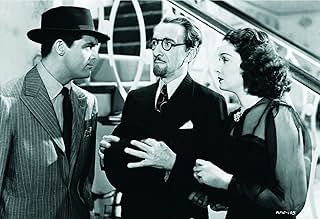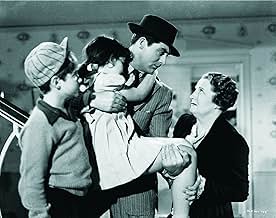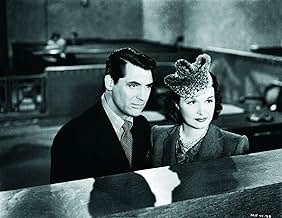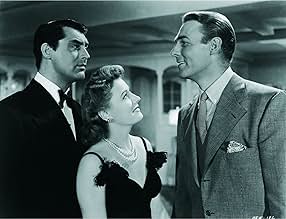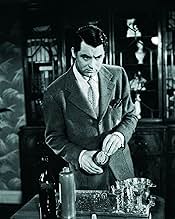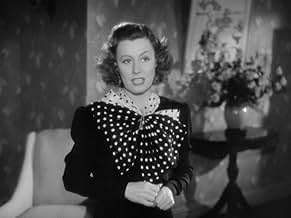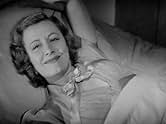NOTE IMDb
7,2/10
12 k
MA NOTE
Disparue depuis sept ans et présumée morte, une femme rentre chez elle le jour du deuxième mariage de son mari.Disparue depuis sept ans et présumée morte, une femme rentre chez elle le jour du deuxième mariage de son mari.Disparue depuis sept ans et présumée morte, une femme rentre chez elle le jour du deuxième mariage de son mari.
- Réalisation
- Scénario
- Casting principal
- Nommé pour 3 Oscars
- 3 victoires et 3 nominations au total
Jean Acker
- Postponed Case Witness
- (non crédité)
Murray Alper
- Yosemite Bartender
- (non crédité)
Leon Belasco
- Waiter - Pacific Club Poolside
- (non crédité)
Joe Cabrillas
- Phillip
- (non crédité)
Bill Cartledge
- Page Boy Paging Burkett
- (non crédité)
Chester Clute
- Shoe Salesman
- (non crédité)
Corky
- Corky the Dog
- (non crédité)
Avis à la une
This is not my favourite screwball comedy of all time or anything, but I did really enjoy it. It is compared to The Awful Truth, and I will say I do prefer The Awful Truth, and while people may find this blasphemous I preferred 1963's Move Over Darling too.
Where the film doesn't quite succeed is that it felt a little too short, the film's end takes a little too long and felt misplaced and there are some moments in the middle where the film drags a bit.
However, it looks good, is well directed, is well scored, while the story is great, the screenplay a lot of fun and the performances from Irene Dunne, Gail Patrick and especially Cary Grant are fun. In terms of casting, the only weak link is Randolph Scott, not that he was terrible or anything but he is very underused seeing his role feels I agree more of a cameo than a fully-fleshed out character. So overall, good but not great, worth seeing for Grant. 6.5/10 Bethany Cox
Where the film doesn't quite succeed is that it felt a little too short, the film's end takes a little too long and felt misplaced and there are some moments in the middle where the film drags a bit.
However, it looks good, is well directed, is well scored, while the story is great, the screenplay a lot of fun and the performances from Irene Dunne, Gail Patrick and especially Cary Grant are fun. In terms of casting, the only weak link is Randolph Scott, not that he was terrible or anything but he is very underused seeing his role feels I agree more of a cameo than a fully-fleshed out character. So overall, good but not great, worth seeing for Grant. 6.5/10 Bethany Cox
After his shipwrecked wife is declared dead and he takes on a new wife, Grant's first wife resurfaces, rescued after seven years on an island. This reteaming of Grant and Dunne after their success with "The Awful Truth" is pretty funny for the most part, as Grant tries to solve the problem of one wife too many while dealing with jealousy after learning that Dunne had a male companion (Scott) on that island. The only complaint is that the laughs stop in the last quarter of the movie, which is rather uninteresting as the focus shifts from comedy to romance. Bates, who is hilarious as a flustered judge, died in July 1940 but managed to act in 12 films released that year!
A curious one that leaves a mildly bitter taste in the mouth. It's funny alright (but never hilarious), and the acting from - and chemistry between - Irene Dunne and Cary Crant is exquisite as always. But the film's fundamental problem is that none of the characters are particularly likable. Throughout the film three of the four main characters take their turn to behave despicably, yet the new wife - a woman who's merely unpleasant - is the villain of the piece; constantly the butt of jokes and fair game for ridicule even though she's done absolutely nothing to warrant it. At times it's like watching two spoilt brats from the Hamptons bullying their visiting second-cousin from the Bronx.
The script is also strangely stunted, best witnessed in the scenes before the judge. They really should have been classic screwball moments - the ingredients were there - yet between the lengthy silences and repetitive parrot-dialogue it falls almost completely flat. The gaping plot holes and poor script continuity can't be forgiven either, even allowing for the fact the film's seventy years old.
Don't get me wrong, I laughed, and I enjoyed myself, and I thought it was a decent film. It's just that the character's actions don't stand up too well under scrutiny.
The script is also strangely stunted, best witnessed in the scenes before the judge. They really should have been classic screwball moments - the ingredients were there - yet between the lengthy silences and repetitive parrot-dialogue it falls almost completely flat. The gaping plot holes and poor script continuity can't be forgiven either, even allowing for the fact the film's seventy years old.
Don't get me wrong, I laughed, and I enjoyed myself, and I thought it was a decent film. It's just that the character's actions don't stand up too well under scrutiny.
This gets pretty good comic mileage out of the often-used 'Enoch Arden' (or, as here, 'Ellen Arden') idea of the long-lost spouse who returns to find his/her spouse now involved with someone else. Numerous movies have used it both for drama and for comedy, and in this case, the premise is adapted to the screwball comedy formula that was so popular for a time in the 1930s and 1940s.
The story starts by slightly revising the usual setup, with Irene Dunne as the formerly shipwrecked spouse, Cary Grant as the husband who has since become involved with another woman (Gail Patrick), plus Randolph Scott as a wild card in the relationships. Practically every stage of the story is highly implausible (probably deliberately so) but amusing, and it is generally left to the cast to make things work, which they usually do.
Grant usually seems quite at home in this kind of comedy, and he and Dunne work well together, depicting their characters' relationship with the kinds of intangibles that help make the whole scenario more believable. Patrick is always quite good as an elegantly icy rival to the heroine, and Scott also works well here in his role. Amongst the supporting cast, Granville Bates gets some very good moments as the grouchy judge.
For as far-fetched as the scenario seems at times, it works pretty well. The cast is strong enough to carry the weight, and it would have been hard to improve upon their combination of talents. It doesn't have quite the depth of comic variety or the subtlety of implied commentary that the best screwball comedies have, but it's an entertaining movie worth seeing.
The story starts by slightly revising the usual setup, with Irene Dunne as the formerly shipwrecked spouse, Cary Grant as the husband who has since become involved with another woman (Gail Patrick), plus Randolph Scott as a wild card in the relationships. Practically every stage of the story is highly implausible (probably deliberately so) but amusing, and it is generally left to the cast to make things work, which they usually do.
Grant usually seems quite at home in this kind of comedy, and he and Dunne work well together, depicting their characters' relationship with the kinds of intangibles that help make the whole scenario more believable. Patrick is always quite good as an elegantly icy rival to the heroine, and Scott also works well here in his role. Amongst the supporting cast, Granville Bates gets some very good moments as the grouchy judge.
For as far-fetched as the scenario seems at times, it works pretty well. The cast is strong enough to carry the weight, and it would have been hard to improve upon their combination of talents. It doesn't have quite the depth of comic variety or the subtlety of implied commentary that the best screwball comedies have, but it's an entertaining movie worth seeing.
Cary Grant makes this the best of the numerous versions of the script -- later attempted as SOMETHING'S GOT TO GIVE (Marilyn Monroe's last film) and remade as MOVE OVER, DARLING.
Just the expressions Grant has on his face make this worth watching. It's a delightful look at him in a classic comic predicament -- a man who thinks his first wife is dead discovers on his honeymoon night with his second wife that wife #1 is still amongst the living. The next complication: she has spent 7 years with another man -- and Grant gets to do his best as the jealous husband.
This is just plain funny.
Just the expressions Grant has on his face make this worth watching. It's a delightful look at him in a classic comic predicament -- a man who thinks his first wife is dead discovers on his honeymoon night with his second wife that wife #1 is still amongst the living. The next complication: she has spent 7 years with another man -- and Grant gets to do his best as the jealous husband.
This is just plain funny.
Le saviez-vous
- AnecdotesCary Grant and Randolph Scott, who play rivals in this film, lived together on and off between 1932 and 1944.
- GaffesWhen Ellen has her first hot shower in seven years, she wears a bathing cap rather than washing her hair in the shower.
- Citations
Nick Arden: I came here with my wife... hum... my bride really. Now my wife, not my bride... my wife... Why should I bore you with details?
Hotel clerk: I won't be bored.
Nick Arden: Listen, it's just simple as A B C.
Hotel clerk: Don't tell me you got someone in B?
- Crédits fousRather than the normal "The End" title as the movie concludes, "Good Night" is drawn in cursive handwriting.
- ConnexionsEdited into Marilyn: Something's Got to Give (1990)
- Bandes originalesJingle Bells
(1857) (uncredited)
Written by James Pierpont
Played as part of the score when Cary Grant dons his Santa Claus costume
Meilleurs choix
Connectez-vous pour évaluer et suivre la liste de favoris afin de recevoir des recommandations personnalisées
- How long is My Favorite Wife?Alimenté par Alexa
Détails
- Durée1 heure 28 minutes
- Couleur
- Rapport de forme
- 1.37 : 1
Contribuer à cette page
Suggérer une modification ou ajouter du contenu manquant

Lacune principale
By what name was Mon épouse favorite (1940) officially released in Canada in French?
Répondre

